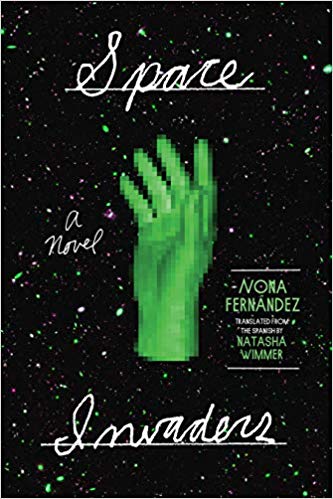Nona Fernandez’s Space Invaders is a dreamy, fictional account that captures the strangeness and uncertainty of youth as well as the pain of looking through muddled memories in search of truth. While the book is labeled as fiction, it is based on Fernandez’s own childhood growing up in Chile under similar circumstances she gives her characters.
Fernandez weaves together the recollections of childhood friends trying to remember their old classmate and friend, Estrella González, who abruptly disappeared when they were kids. Bound by the shared experiences of attending a strict school, playing their favorite video game “Space Invaders,” and growing up in dangerous, dictator-ruled 1980s Chile, the kids, now adults, are haunted by the imprint Estrella left on their lives. As they try to both move on with their lives and remember every detail of the mysterious Estrella they find they all remember her differently; one recalls her hair in braids, another recalls her hair smelling of gum, and another can’t remember her hair at all, only her voice. The only one to ever have visited her home recalls her mother, her dead brother’s photographs hanging on their walls, and watching her father remove his wooden hand, a hand that goes on to haunt him in his dreams. Told with details that swirl between fact and fantasy, each memory slowly pieces together a fractured picture of Estrella and their shared experiences before her disappearance.

In its short seventy-odd pages, Space Invaders doesn’t so much tell a complete story as it does give us snapshots of what it might be like growing up in the reality of a dictatorship. Fernandez gives us narrators who cannot always distinguish true memory from fantasies and dreams, and often they are all mixed together, giving the entire read a twinge of uncertainty that feels purposeful on Fernandez’s part. The kids are often at the mercy of choices made for them by their parents, their school, and their government. They have no control over their lives other than what they make for themselves, such as making out in dark classrooms or escaping for a day at the beach.
Space Invaders is a breezy, quick read, but it doesn’t need more than its novella length to leave its surreal, eerie, and emotionally tangled impact on readers. Somewhere between the relatable, teenage hormone-driven moments and the unfamiliar immersion into eighties-era Chile, Fernandez manages to create something that’s as memorable as it is foreign. Intricately layered and written with an air of otherworldly grace, Space Invaders will capture you from its first page and quietly pull you into its video game-inspired world.




